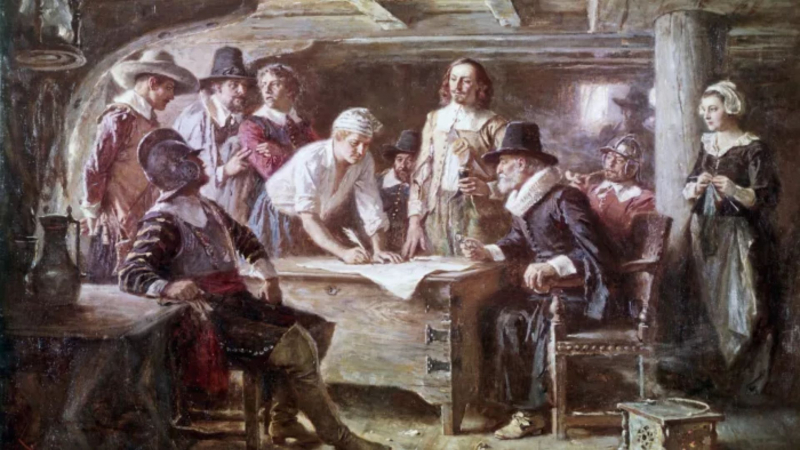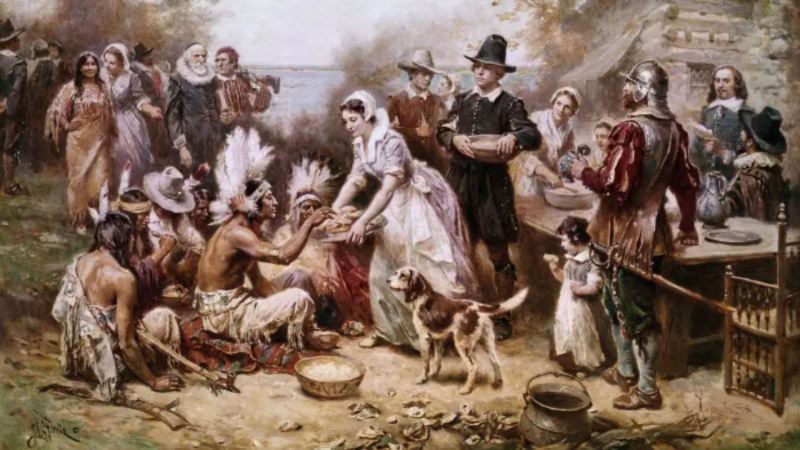Pilgrims – Early settlers (17th Century)

In September 1620, the Mayflower set sail from England with 100 individuals, many of whom were seeking religious freedom in the New World. The ship arrived on the shores of Cape Cod, Massachusetts, in November of that year. A scouting expedition was dispatched, and in late December, the group landed in Plymouth Harbor, where they would establish the first permanent European settlement in New England. The Pilgrim Fathers, or simply the Pilgrims, were the first settlers of Plymouth Colony.
The Mayflower Voyage
The group that set out from Plymouth, in southwestern England, in September 1620 included 35 members of the English Separatist Church, a radical Puritan faction. After illegally seceding from the Church of England in 1607, the Separatists fled to the Netherlands, first to Amsterdam and then to Leiden, where they remained for the following decade under the relatively mild Dutch rules. They began to make arrangements to live in the New World because of economic hardships and anxieties of losing their English language and history. Their intended destination was a location near the Hudson River, which was regarded to be part of Virginia's previously established colony at the time. In 1620, the would-be settlers formed a London stock company to fund their voyage aboard the Mayflower, a three-masted commercial ship. The Speedwell, a smaller vessel that accompanied the Mayflower and carried part of the passengers, proved unseaworthy and was forced to return to port by September.
The Mayflower Compact
Some of the most notable passengers on the Mayflower included Myles Standish, a professional soldier who would become the new colony's military leader, and William Bradford, a Separatist congregation leader and author of "Of Plymouth Plantation," his account of the Mayflower voyage and the founding of Plymouth Colony.
Rough seas and storms prevented the Mayflower from reaching its intended destination in Virginia, and after a 65-day voyage, the ship arrived on the shores of Cape Cod, docking at Provincetown Harbor in mid-November. Before the would-be colonists even exited the ship, there was strife. The passengers who were not separatists - dubbed "strangers" by their more doctrinal peers - argued that the Virginia Company contract was null and void since the Mayflower landed beyond Virginia Company territory. "Several foreigners made discontented and mutinous statements," William Bradford subsequently recounted.
Settling at Plymouth
The Pilgrims realized that if something wasn't done fast, every man, woman, and family would be on their own. While still on the ship, a group of 41 men signed the so-called Mayflower Compact, agreeing to form a "social body politic." This document would serve as the basis for the new colony's government. The Mayflower Compact, signed on November 11, 1620, was the first treaty to create self-government in the New World.
In mid-December, after sending an exploring team ashore, the Mayflower arrived at what became known as Plymouth Harbor, on the western side of Cape Cod Bay. The immigrants spent the next several months largely on the Mayflower, transported back and forth from shore to establish their new store and living facilities. Burial Hill was the site of the settlement's initial fort and watchtower (the area contains the graves of Bradford and other original settlers).
During that first winter, more than half of the English settlers died as a result of poor diet and inadequate shelter in the hard weather. Leaders like Bradford, Standish, John Carver, William Brewster, and Edward Winslow helped keep the remaining settlers together. Bradford was unanimously elected governor of Plymouth in April 1621, following the death of the settlement's first governor, John Carver; he would be reelected 30 times and remained as governor of Plymouth for all but five years until 1656.
The First Thanksgiving
The Wampanoag people, who had lived in the area around Plymouth Colony for 10,000 years before Europeans arrived, were the original inhabitants of the area. Soon after the Pilgrims established their settlement, they met Tisquantum, or Squanto, an English-speaking Native American. Squanto was a member of the Pawtuxet tribe (from present-day Massachusetts and Rhode Island), which was captured by explorer John Smith's soldiers in 1614-15. He escaped slavery in England and returned to his native area to find that most of his people had perished from the plague. Squanto taught the Pilgrims how to plant corn, which became a major crop, as well as where to fish and hunt beaver, in addition to interpreting and mediating between colonial authorities and Native American chiefs (particularly Massasoit, chief of the Pokanoket). The Pilgrims famously celebrated a harvest feast with the Pokanokets in the fall of 1621; the meal is today considered the basis for the first Thanksgiving holiday. The first Thanksgiving most certainly did not feature turkey or mashed potatoes (potatoes were still making their way from South America to Europe), but the Wampanoag brought deer and plenty of local fish, as well as the products of the first pilgrim harvest, including pumpkin.
Relations with Native Americans
Squanto died in 1622 while working as Bradford's guide on a voyage across Cape Cod, after attempting to strengthen his own influence by turning the Pilgrims against Massasoit.
Other tribes, such as the Massachusetts and Narragansetts, were hostile to European settlers, and Massasoit's partnership with the Pilgrims strained relations among the region's Native American peoples. As the former group controlled more and more areas over the next few decades, relations between settlers and Native Americans deteriorated. By the time William Bradford died in 1657, he had already expressed concern that violence might soon tear New England apart. Bradford's warnings came true in the form of King Philip's War in 1675. (Philip was the English name of Metacomet, Massasoit's son and Pokanoket leader since the early 1660s.) This fight killed over 5,000 New England residents, including three-quarters of Native Americans. In terms of the population murdered, King Philip's War was more than twice as expensive as the American Civil War and seven times as expensive as the American Revolution.
The Pilgrim Legacy in New England
Under King James I and his successor, Charles I, repressive attitudes toward religious nonconformists in England drove many men and women to follow the Pilgrims to the New World. Following the Mayflower, three other ships arrived in Plymouth: the Fortune (1621), the Anne, and the Little James (both 1623). In 1630, the Massachusetts Bay Company secured a charter from King Charles I and landed a group of 1,000 Puritan refugees under Governor John Winthrop in Massachusetts. Winthrop quickly built Boston as the capital of the Massachusetts Bay Colony, which would become the region's most populated and richest colony.
In comparison to other groups that established colonies in New England, such as the Puritans, the Pilgrims of Plymouth did not enjoy long-term economic success. Some notable members of the original group, including Brewster, Winslow, and Standish, left the colony after the early 1630s to establish their own colonies. The cost of fighting King Philip's War harmed the colony's already-struggling economy. King James II chose a colonial governor to reign over New England less than a decade after the conflict, and Plymouth was integrated into the larger entity of Massachusetts in 1692.
Bradford and the other Plymouth settlers were initially referred to as "Old Comers" rather than "Pilgrims." This changed after the discovery of a text in which Bradford referred to the settlers who left Holland as "saints" and "pilgrimes." At a bicentennial celebration of the colony's founding in 1820, orator Daniel Webster used the term "Pilgrim Fathers," and the phrase stuck.


























